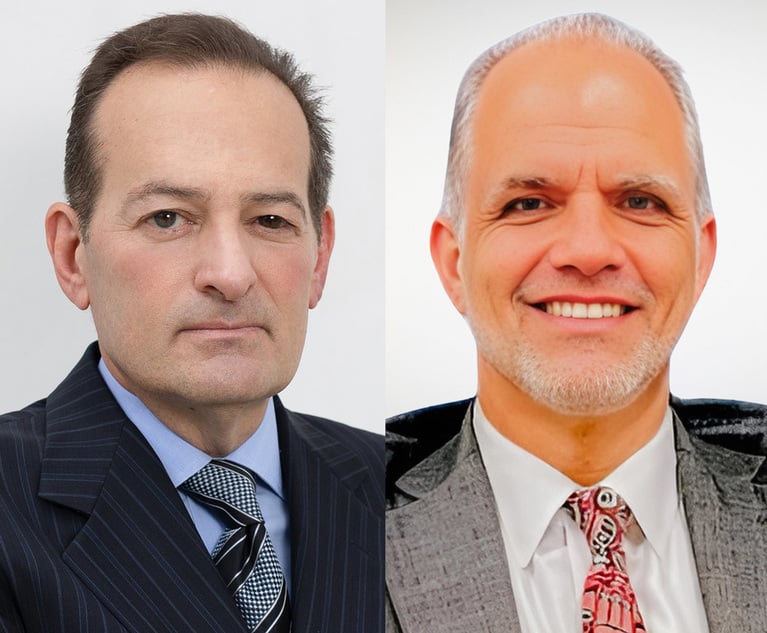A New Miami-Dade Civil Courthouse: Our County's Residents Deserve Better
The immediate need for a new Miami-Dade civil courthouse—to handle the county's overcrowded docket of civil cases—is beyond dispute.
March 23, 2018 at 10:15 AM
4 minute read

The immediate need for a new Miami-Dade civil courthouse—to handle the county's overcrowded docket of civil cases—is beyond dispute. As a bar association comprised of attorneys and judges who regularly litigate in the civil courthouse on 73 W. Flagler St., the Cuban American Bar Association submits that the building—originally constructed in 1928—is woefully inadequate to handle the county's civil litigation workload. The building is in disrepair. There are not enough courtrooms. Meanwhile, most of the existing courtrooms are completely unsuited for trials, because they are too small, because of their impractical layout and because they lack in even basic technological capabilities. This is just a short list of the problems with our courthouse.
Our county's residents and its businesses deserve—and more importantly, need—a new, more expansive courthouse. This is a thriving, growing metropolitan area with a massive economy that is a world-wide hub for international commerce. As a consequence of our county's economic growth, our county courts oversee a civil caseload that continues to expand and includes significant disputes. The current courthouse facility simply cannot meet our county's growing legal needs. Unfortunately, the nearly-century old courthouse building has exceeded its lifespan.
There is no real dispute about this. The Miami-Dade Court Capital Infrastructure Task Force prepared a nearly 800-page report, where it voted 7-1 in favor of an expansive 50-courtroom, 600,000-square-foot courthouse, and the county commission unanimously passed multiple resolutions requesting that the county administration solicit bids for the construction of a new courthouse in downtown Miami near the existing courthouse.
Recently, on Jan. 11 of this year, the New Flagler Courthouse Development Partners (Flagler Development) submitted an unsolicited bid for the construction of the new courthouse. The unsolicited bid included an offer to purchase the existing courthouse.
On Feb. 8, the Miami-Dade County mayor recommended that the county commission reject the unsolicited bid for three basic reasons. First, the unsolicited bid places the new courthouse on Flagler Street while the administration prefers a site adjacent to the Children's Courthouse. Second, the administration would prefer to try to monetize (i.e., sell) the proposed Flagler Street site. Third, the administration opines that the unsolicited bid proposal process would “inhibit market competition” for the request for proposal process for a new courthouse that the administration started after it received the unsolicited bid.
On Feb. 22, however, the county commission rejected the mayor's recommendation and passed a resolution supporting the unsolicited bid process. The county commission directed that the administration pursue a dual track of the unsolicited bid and RFQ/RFP process and consider both the Flagler Street site and the Children's Courthouse site.
We, the members of CABA, support the county commission and their decision.
First, it is our recommendation that the county return to its original plans for a more expansive new courthouse. The task force, after extensive study, made very specific recommendations as to the size of the new courthouse. The administration has suggested that it would like to pursue a smaller courthouse. But that suggestion is not based upon any known study or analysis other than the fact that it would obviously cost less. We do not want the county to build a new courthouse that will be obsolete within a short time, nor do we want to have to return to the county to request construction of (and more money for) new courtrooms in shell spaces.
Second, we advise that timing be of the essence for this courthouse project. We believe that by opening the unsolicited bid, we will accelerate the timeline on this long overdue and already seriously delayed project. Time is the greatest enemy of an undertaking of this magnitude and we are concerned that the RFQ process will delay construction and ultimately completion of the project, deep into the next decade. Our citizens deserve a civil courthouse that meets minimum safety, sanitary and health standards. We cannot suffer another half of a decade practicing in a building that would otherwise have been condemned were it not county property.
Third, the most suitable location for the new courthouse would be adjacent to 73 W. Flagler St. courthouse. This particular site will pay proper homage to the iconic Miami-Dade County courthouse, while re-invigorating the Flagler street corridor. In addition, the site near the Children's Courthouse can be preserved for auxillary facilities to serve our children and families in the future.
Jorge L. Piedra is president of the Cuban American Bar Association.
This content has been archived. It is available through our partners, LexisNexis® and Bloomberg Law.
To view this content, please continue to their sites.
Not a Lexis Subscriber?
Subscribe Now
Not a Bloomberg Law Subscriber?
Subscribe Now
NOT FOR REPRINT
© 2025 ALM Global, LLC, All Rights Reserved. Request academic re-use from www.copyright.com. All other uses, submit a request to [email protected]. For more information visit Asset & Logo Licensing.
You Might Like
View All
Florida Lawyers Assistance in Need of Reform for Fairer Mental Health, Substance Abuse Monitoring
6 minute read


'It's a Great Day to Be a Gator Lawyer': UF Takes Top Spot on Bar Exam
Trending Stories
Who Got The Work
J. Brugh Lower of Gibbons has entered an appearance for industrial equipment supplier Devco Corporation in a pending trademark infringement lawsuit. The suit, accusing the defendant of selling knock-off Graco products, was filed Dec. 18 in New Jersey District Court by Rivkin Radler on behalf of Graco Inc. and Graco Minnesota. The case, assigned to U.S. District Judge Zahid N. Quraishi, is 3:24-cv-11294, Graco Inc. et al v. Devco Corporation.
Who Got The Work
Rebecca Maller-Stein and Kent A. Yalowitz of Arnold & Porter Kaye Scholer have entered their appearances for Hanaco Venture Capital and its executives, Lior Prosor and David Frankel, in a pending securities lawsuit. The action, filed on Dec. 24 in New York Southern District Court by Zell, Aron & Co. on behalf of Goldeneye Advisors, accuses the defendants of negligently and fraudulently managing the plaintiff's $1 million investment. The case, assigned to U.S. District Judge Vernon S. Broderick, is 1:24-cv-09918, Goldeneye Advisors, LLC v. Hanaco Venture Capital, Ltd. et al.
Who Got The Work
Attorneys from A&O Shearman has stepped in as defense counsel for Toronto-Dominion Bank and other defendants in a pending securities class action. The suit, filed Dec. 11 in New York Southern District Court by Bleichmar Fonti & Auld, accuses the defendants of concealing the bank's 'pervasive' deficiencies in regards to its compliance with the Bank Secrecy Act and the quality of its anti-money laundering controls. The case, assigned to U.S. District Judge Arun Subramanian, is 1:24-cv-09445, Gonzalez v. The Toronto-Dominion Bank et al.
Who Got The Work
Crown Castle International, a Pennsylvania company providing shared communications infrastructure, has turned to Luke D. Wolf of Gordon Rees Scully Mansukhani to fend off a pending breach-of-contract lawsuit. The court action, filed Nov. 25 in Michigan Eastern District Court by Hooper Hathaway PC on behalf of The Town Residences LLC, accuses Crown Castle of failing to transfer approximately $30,000 in utility payments from T-Mobile in breach of a roof-top lease and assignment agreement. The case, assigned to U.S. District Judge Susan K. Declercq, is 2:24-cv-13131, The Town Residences LLC v. T-Mobile US, Inc. et al.
Who Got The Work
Wilfred P. Coronato and Daniel M. Schwartz of McCarter & English have stepped in as defense counsel to Electrolux Home Products Inc. in a pending product liability lawsuit. The court action, filed Nov. 26 in New York Eastern District Court by Poulos Lopiccolo PC and Nagel Rice LLP on behalf of David Stern, alleges that the defendant's refrigerators’ drawers and shelving repeatedly break and fall apart within months after purchase. The case, assigned to U.S. District Judge Joan M. Azrack, is 2:24-cv-08204, Stern v. Electrolux Home Products, Inc.
Featured Firms
Law Offices of Gary Martin Hays & Associates, P.C.
(470) 294-1674
Law Offices of Mark E. Salomone
(857) 444-6468
Smith & Hassler
(713) 739-1250






